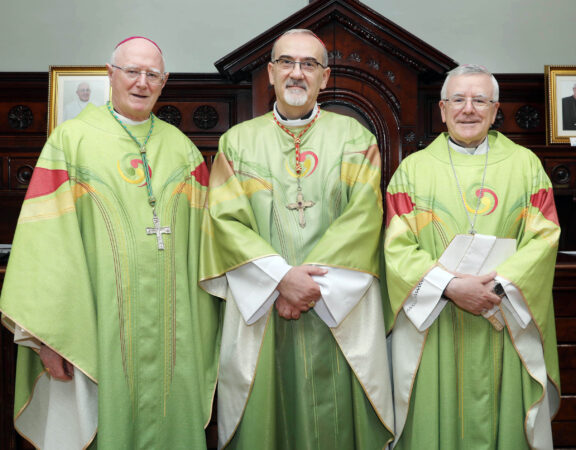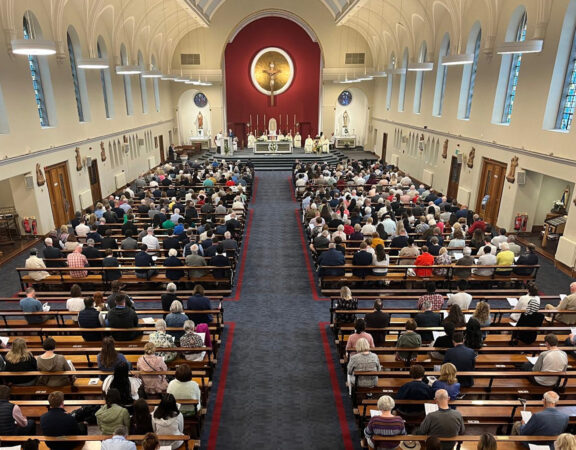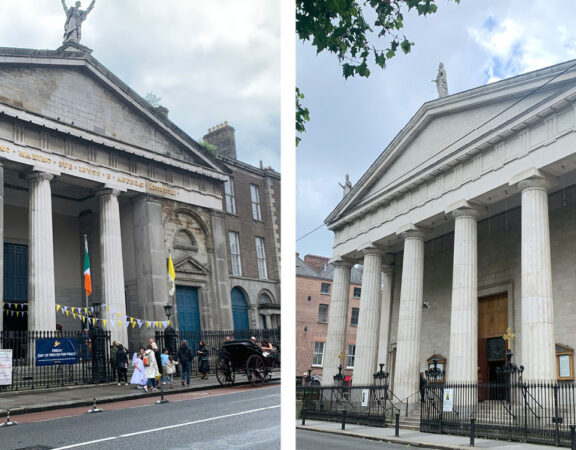Pentecost 2010
FESTIVAL OF PEOPLES
Homily Notes of
Most Rev. Diarmuid Martin
Archbishop of Dublin and Primate of Ireland
———
Pro-Cathedral, 22nd May 2010
Most Rev. Diarmuid Martin
Archbishop of Dublin and Primate of Ireland
———
Pro-Cathedral, 22nd May 2010
The Preface of the Mass of Pentecost sums up the meaning of our celebration today as a “Festival of Peoples”, the celebration of the diversity of ethic identity gathered within the one family of the Archdiocese of Dublin. The Preface sums up above all the deep meaning of the Feast of Pentecost which we celebrate:
“Today we celebrate the great beginning of the Church,
when the Holy Spirit made known to all peoples the one true God,
and created form the many languages of humankind,
one voice to profess one faith”.
when the Holy Spirit made known to all peoples the one true God,
and created form the many languages of humankind,
one voice to profess one faith”.
The event of Pentecost constitutes the establishment of the Church. The characteristic of that Church was its call to be a witness to the unity of all humankind in Jesus Christ.
The Church is not just a collection of individuals, but a witness to how faith in Jesus Christ fosters the unity of all peoples. The Apostles who had been shaken in their belief after the events Christ’s death, resurrection and ascension were changed by the Holy Spirit and went out into the streets proclaiming and interpreting the message of Jesus. The Spirit changed them in such a way that the events which at first seemed to them scandal and disillusionment were now understood in their true sense as a message of the triumph of Jesus over death, a message of hope and a message of unity.
Those who were present at the Pentecost event, the Acts of the Apostles recall, each heard the Apostles speak in their own language. This event became a sign of how the Church of Jesus Christ would spread and enter into the lives and the culture and the heritage of peoples in any part of the world.
Anywhere the Church exists and celebrates the Eucharist it witnesses to the unity of all humankind, symbolised and nourished by the One Bread, the One Cup around the One Table. The Eucharist is a sign of unity. Those who partake in the Eucharist witness to a faith which generates a new sense of the unity of humankind.
There can never be a celebration of the Eucharist which is not open to worshippers of all backgrounds. Racism, xenophobia, or exclusive nationalism are all alien to a Eucharistic spirituality. Today’s celebration is a celebration not just of diversity but of welcome and belonging. This Eucharist and the life of the Church in this diocese must be marked by a spirit of openness and welcome to all believers, The Eucharist and the life of the Church must be marked the in daily life to witness as welcome and openness to all.
The demographics of Ireland have changed remarkably in a very short period of time. One has only to walk through the streets around this Pro-Cathedral to see how deep-rooted and embedded ethnic diversity in Ireland has become. The roots of this demographic change had their origin in an economic necessity for labour at a time of prosperity. We needed workers. What we welcomed was not just labour; it was and is people, men and women, who contribute by their work and their cultures to a richer Dublin in many ways and not just though an economic input alone. The new demographics may have roots in economic necessity; our welcome and the continued presence of those who have come to our shore is no longer just an economic question; it is about people.
In times of economic downturn there is danger that we would think of immigrants as disposable, as so many commodities and factors in our consumer culture are used or disposed of according to necessity or whim. While controls of immigration are legitimate and necessary, people – together with their families – who in Irish society contribute to our common good have rights to security by the fact of their human dignity.
I wish to pay a special tribute to our schools which have done extraordinary work in welcoming the children of immigrants and helping them to develop truly as “Irish of dual culture” and thus contributing to changing demographics into a new definition of Irishness and of welcome.
The Feast of Pentecost which we celebrate today reminds us that faith in Jesus involves a new understanding of the unity of humankind in Jesus Christ.
The ability of all who heard the message of the Apostles at the first Pentecost to understand the message of Jesus in their own language, reminds us further that the changing culture of unity brought about by Christ’s message and his Church is not just territorial but also intergenerational. Yes, the message of Jesus Christ can be understood and acclaimed by the many languages of humankind and by people from every geographical background. That same message can be understood by each successive generation with its differences in culture, communication, progress and scientific development. No society is too sophisticated not to be able to understand the message of Jesus within the context of its culture. No society is too sophisticated not to need the message of Jesus Christ.
Is faith in Jesus more difficult today than at other moments in history? Why has the level of practice in Ireland undergone such a change in recent years? Is there a crisis of faith in Ireland today and what are its roots?
The Pentecost event and the life of the early Church which was founded with the coming of the Sprit can help us address these questions. Looking at the description of the early Church community as illustrated in the Acts of the Apostles we see certain characteristics. As we have noted the barriers of race and nationality became destined to break down and the mission of the Church is to be the place where all people can gather and find a home.
One of the distinctive words used in the Acts of the Apostles about the early Church was that very concept of “gathering”. The believers gathered in one place. And a characteristic of that gathering was that they shared:
“All who believed were together and they had all things in common” (Acts 2: 44).
The community of the first believers gathered for the prayers to reflect on the word of God and to break the bread together; they shared everything that they had, so that no one remained in need.
Today we have strong tendency towards individualism in our understanding of the Christian faith. We encounter a sort of book Christianity, something which serves to inspire my life and provide a personal spirituality, which I can have whether I ever enter a Church or belong to a worshipping community. Faith, however, is personal but not individualist. The Church is not a spiritual supermarket where I can serve myself and top-up on means to save my own soul without ever speaking to anyone else. Gathering and sharing in the faith are essential dimensions of being believing Christians.
This is not to say that we should return to think that the strength of the Church is measured by numbers, by roll-calls or head counts at Sunday Mass. The gathering inspired by faith in Jesus Christ is a deeply personal recognition of being called into a community which shares in and lives out a deep mystery. It is not a community which we create, but one in which, as our second reading reminded us, “the Spirit comes to help us in our weakness”; it is the “Spirit who puts into words” thoughts and deeds which we ourselves would never be capable of doing. The Spirit changes us.
Gathering and welcoming the many faces of humankind will never be witnessed to by any form of exclusivism. No single cultural model can ever express the richness of the unity of humankind. The faith must be inculturated into the culture of each generation. It must be understandable to each generation and each culture. But such inculturation is not simple adaptation to the culture of the day but rather fruitful engagement with the culture of the times. Christians must be citizens of the culture of their time yet also be counter cultural, able to challenge and enrich the world we live in.
This means finally that the Church should never become trapped in the cultural trappings of one period of time. A spirit-led Church will be free. Someone at a meeting the other day said that the problem of the Irish Church is that it is still wearing clothes which were measured for the Church of another time and another stature. Demographic and cultural changes are not something we hope will go way. They are challenges which we have to face and around which we should rejoice. The Spirit may well be using them to free us to be more authentic witnesses to the message of Jesus in a purified Church.







